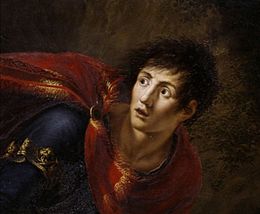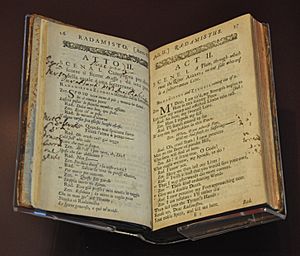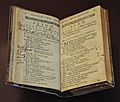Rhadamistus facts for kids
Quick facts for kids Rhadamistus |
|
|---|---|

Rhadamistus by Francesco Alberi
|
|
| King of Armenia | |
| Reign | 51–53 54–55 |
| Predecessor | Mithridates Tiridates I |
| Successor | Tiridates I |
| Born | Kingdom of Iberia |
| Died | 58 Kingdom of Iberia |
| Spouse | Zenobia |
| Issue | unknown son |
| Dynasty | Pharnavazid dynasty |
| Father | Pharasmanes I of Iberia |
| Mother | daughter of Tigranes IV |
Rhadamistus (Georgian: რადამისტი, radamist'i, Armenian: Հռադամիզդ, Hřadamizd) (died 58 AD) was a prince from the Pharnavazid dynasty of the Iberian Kingdom. He ruled the Kingdom of Armenia twice, from 51 to 53 AD and again from 54 to 55 AD. People saw him as someone who took power illegally (a usurper) and ruled harshly (a tyrant). He was eventually removed from power by a rebellion that the Parthian Empire supported.
Contents
Rhadamistus's Early Life and Ambition
Rhadamistus was the oldest son of King Pharasmanes I of Iberia. His mother was an Armenian princess from the Artaxiad dynasty. She was the daughter of the Armenian rulers Tigranes IV and his sister-wife Erato.
Rhadamistus was known for being very ambitious. He was also strong, tall, good-looking, and brave. He grew impatient because his father, King Pharasmanes, was old but still held onto the throne of Iberia. Rhadamistus felt that even if he became king of Iberia, it wouldn't be enough for him.
His bold talk about taking power worried his father. Pharasmanes feared his son might try to take his throne. So, the king convinced Rhadamistus to start a war against his uncle, King Mithridates of Armenia.
How Rhadamistus Tricked His Uncle
Rhadamistus pretended to have a fight with his father and stepmother. He then went to his uncle Mithridates, who welcomed him like his own son and treated him very kindly.
Later, Rhadamistus pretended to make up with his father and went back to Iberia. He told his father that everything was ready for war. Meanwhile, King Pharasmanes made up a reason for the war. He claimed Mithridates had opposed him when he fought the king of Albanians and asked Rome for help.
Pharasmanes gave Rhadamistus a large Iberian army. They launched a surprise attack that forced Mithridates to hide in the fortress of Gorneas. Roman soldiers guarded this fortress.
Rhadamistus tried to convince his uncle to surrender. He reminded Mithridates that they were relatives and that Rhadamistus was married to Mithridates' daughter, Zenobia. He promised that the Iberians wanted peace.
The Fall of Mithridates
A Roman officer named Pollio was bribed by Rhadamistus. Pollio convinced the Roman soldiers to threaten to give up the fortress. Under this pressure, Mithridates agreed to surrender to his nephew.
When Mithridates came out, Rhadamistus pretended to be respectful. He hugged his uncle and called him "father-in-law." He promised not to harm him. However, Rhadamistus led Mithridates into a nearby forest. There, he broke his promise and killed Mithridates and his family.
Rhadamistus as King of Armenia
Rhadamistus became the King of Armenia in 51 AD. The Romans did not help their Armenian allies much. They only told Pharasmanes to take his son out of Armenia.
The Roman governor of Cappadocia, Paelignus, invaded Armenia and caused damage. The governor of Syria sent troops to help, but they were called back to avoid a war with Parthia.
Conflict with Parthia
Because of this, King Vologases I of Parthia saw a chance to help his brother, Tiridates. He wanted to bring Armenia back under Parthian control. In 51 AD, Vologases sent a large army into Armenia. They drove out the Iberians in 53 AD.
However, a very cold winter and a terrible disease forced the Parthians to leave Armenia. This allowed Rhadamistus to return.
When Rhadamistus came back, he was even harsher than before. He treated the Armenians very cruelly, seeing them as rebels. He punished cities that had surrendered to the Parthians. Because of his harsh rule, the Armenians soon rebelled again. In 55 AD, they replaced him with the Parthian prince Tiridates I.
Rhadamistus's Escape and Death
Rhadamistus escaped with his pregnant wife, Zenobia. She was unable to ride a horse for long. Fearing capture, she asked Rhadamistus to kill her so she wouldn't be taken prisoner. He did so and placed her body in a river.
However, Zenobia was still alive when she floated to the river's edge. Some shepherds found her. They saw she looked noble, so they treated her wound. When they learned who she was, they took her to the city of Artaxata, where King Tiridates welcomed her kindly.
Rhadamistus returned to Iberia, his home kingdom. But in 58 AD, his own father, Pharasmanes, had him put to death. Pharasmanes did this to show his loyalty to Rome and Emperor Nero. Pharasmanes himself died later that same year. His second son, Mihrdat, became the new king of Iberia.
In Art

Paintings
- "Radamisto uccide Zenobia" by Luigi Sabatelli (1803).
- "Rhadamistes and Zenobia" by Jean-Joseph Taillasson.
- "Shepherds Find Zenobia on the Banks of the Araxes" by William Bouguereau (1850).
- "Radamisto in atto di spingere Zenobia ferita nel fiume Arasse" by Francesco Alberi.
- "Queen Zenobia Thrown Into the Araxes River" by François-Nicolas Chifflart.
- "Rhadamiste poignarde sa femme Zénobie" by Etienne Meslier.
Operas
- "L’Amour tyrannique" by Georges de Scudéry (1638).
- "Zenobia e Radamisto" by Giovanni Legrenzi (1665).
- "Radamisto" by Tomaso Albinoni (1698).
- "L'amor tirannico, o Zenobia" by Domenico Lalli (1710).
- "Rhadamiste et Zénobie" by Prosper Jolyot de Crébillon (1711).
- "Radamisto" by George Frideric Handel (1720).
- "Radamisto" by Nicola Francesco Haym.
- Senesino was the first to play Rhadamistus.
Plays
- Unfinished play "Rodamist i Zenobiya" by Alexander Griboyedov.
Images for kids
-
Opera Radamisto by George Frideric Handel, 1720.
-
Rhadamistus from the opera of Metastasio
See also
 In Spanish: Radamisto para niños
In Spanish: Radamisto para niños
 | Delilah Pierce |
 | Gordon Parks |
 | Augusta Savage |
 | Charles Ethan Porter |




